TV, Interrupted: High Fidelity Was The One That Got Away
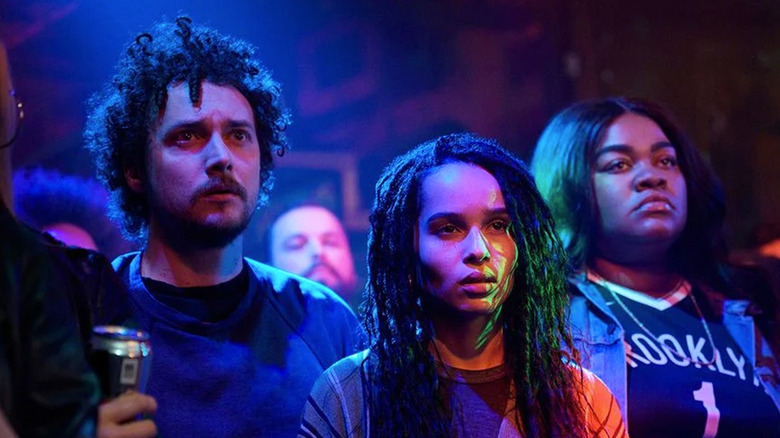
(Welcome to TV, Interrupted, a series where the /Film team remembers, eulogizes, and makes a case for the revival of TV shows we loved that were canceled far too soon.)
Growing up, I found that consuming TV as religiously as I did endeared me to two kinds of characters: the women of color who looked like me (but didn't necessarily share many internal sensibilities), and the cranky, curmudgeonly white dudes that I felt were me personified. The latter enjoyed an indelible amount of freedom on screen (as did their counterparts in real life). They were allowed to be fully-formed, even unlikable, human beings -- to make mistakes and, above all, be a little selfish. They were allowed to express their brashest opinions — solicited or otherwise! — as if they were the only things that mattered.
All this is to express the fact that I envy that freedom. I envy the ability to deliver impassioned, opinionated speeches about stuff no one else cares much about, to shed the "aww, shucks" guise of faux humility and dig my heels in even when I'm wrong. The freedom to be wrong was not a common privilege for female characters of color — at least not in the pre-Shondaland universe of the late 90s. The "unlikable" woman is itself a concept that's taken a while to gel in the public zeitgeist, even by today's standards. Compared to the bottomless chasm of white male-driven stories in films, television, and books, this truth presents a double standard that's nothing short of infuriating.
It's exactly why shows like "High Fidelity" — a seamless riff on the white male-driven film and novel of the same name — are so important ... and why the cancelation of such shows feels equally devastating.
Why High Fidelity Was Great
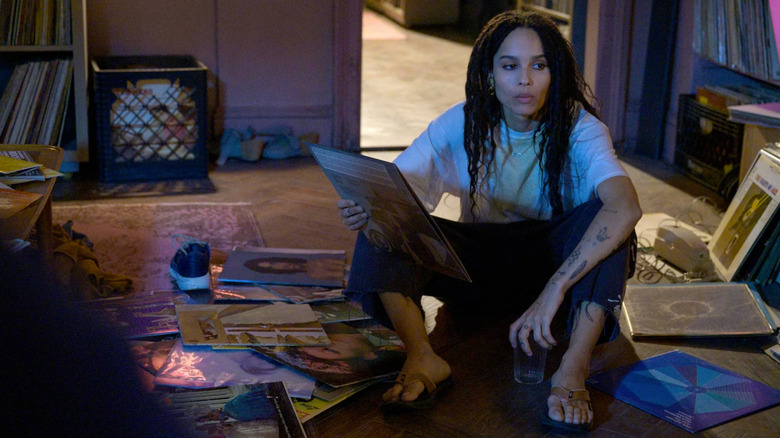
Most people remember their worst heartbreaks with a crushing kind of clarity. They know exactly where they were, what they were doing, maybe even what they were wearing — and most importantly, who it was that broke their heart. A certain kind of person will obsess over these moments long after they've occurred, replaying memories to figure what exactly went wrong. And for a still-rarer person, the kind that exists most commonly in fiction, this fixation might even become their new reality.
It's like this for Rob, the subject of Nick Thornby's 1995 novel (and its 2000 film adaptation) "High Fidelity." Rob lives his life one fixation at a time. For the most part, his focus is music — but he doesn't love it so much as he does the idea of loving it. His knowledge on the subject surpasses the encyclopedic, and he wields this knowledge in the same insufferable way that has become so popular in discourse on Film Twitter.
Rob owns a record shop, Championship Vinyl, but it's less a means of income as it is an echo chamber for his aggrandizing opinions about music, life and women. His two employees-slash-friends, Dick and Barry, share Rob's dude-like desire to condescend with their pop culture knowledge. They spend their days making "Top 5" lists that attest to their elite tastes, and mercilessly judge their customers for theirs. Naturally, they don't realize that they're kind of the worst.
What makes Hulu's "High Fidelity" such a revelation — aside from its killer atmosphere and clear-eyed commentary on modern love — is that none of this changes, though the core cast certainly does. Zoë Kravitz, Da'Vine Joy Randolph, and David H. Holmes step in for John Cusack, Jack Black and Todd Louiso, respectively. This new trio — comprised of a mixed-race, bisexual woman; a plus-sized, dark-skinned black woman; and a gay man — remain exactly as pretentious, standoffish and unapologetic as their counterparts. They sneer at soft rock Boyz 2 Men covers and disparage the customers who have the nerve to Shazam a song in their store. They're jerks! But not only that: they're absolutely allowed to be jerks.
So much of the dialogue and characterization from the original "High Fidelity" translates seamlessly to the reboot. That Rob and her friends behave more like the white guys that frequent the Criterion section at Barnes & Noble is not a common occurrence by any means. It makes Kravitz's Rob the perfect blend of the two characters I felt torn between growing up, and it's exactly how all characters should be written — not so much with flaws, but with the freedom to take up space the same way white guys do.
Why High Fidelity Was Canceled
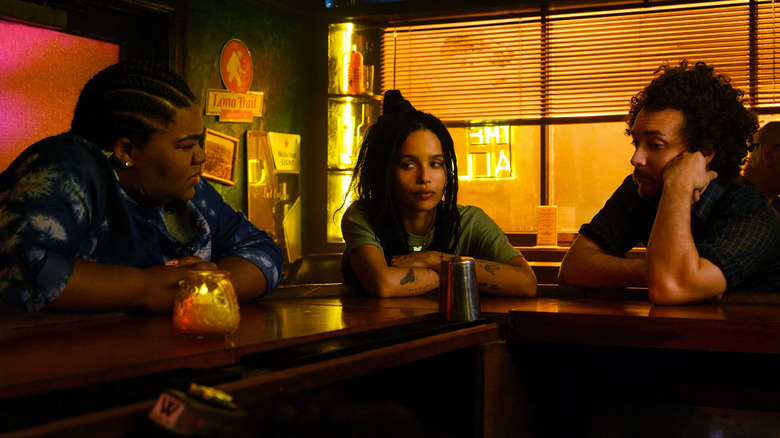
Despite its 10 bingeworthy episodes, generous acclaim, and big plans from showrunners Veronica West and Sarah Kucserka, Hulu still dumped "High Fidelity" in August 2020. According to Deadline, the decision "was not easy and came after lengthy deliberations," but the streamer never explained how the series made it to the chopping block in the first place. It's possible that viewership failed to meet expectations, but the process of recording that sort of thing isn't an exact science, is it?
The sudden news of cancelation naturally shocked and frustrated everyone — not in the least Zoë Kravitz, who executive produced and wrote for "High Fidelity" as well. Following the announcement, the actress bid farewell to the series via Instagram. Kravitz thanked all who were involved in creating and supporting the show, but not without throwing a bid of shade: "At least Hulu has a ton of other shows starring women of color we can watch. Oh wait."
Kravitz maintains that the streamer made "a big mistake" in axing the show. "They didn't realize what that show was and what it could do," she recently told Elle. "The amount of letters, DMs, people on the street, and women that look like us — like, that love for the show, it meant something to people."
Unfinished Business
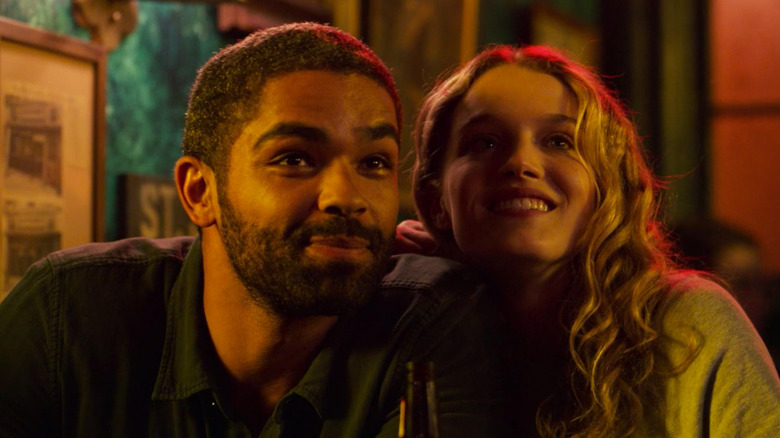
That "High Fidelity" ended on a satisfactory note softens the blow of its cancelation — but only marginally. Rob spends the majority of her 10-episode arc pining over her last great love, Russell "Mac" McCormack (Kingsley Ben-Adir), whose sudden engagement to a girl who loves puppies, flowers, and sunsets prompts a real existential crisis. Rob embarks on a quest to interrogate her top five greatest heartbreaks and discover what exactly went wrong with each of them — less so that she can actually change and more to prove that she's not cursed with bad luck.
Along the way, Rob meets Clyde (Jake Lacy), the polar opposite of every person she's ever dated. He finds Fleetwood Mac a niche interest and spends his weekends at indoor rock climbing gyms. He drives a Prius. He wears North Face puffer vests. Despite all that, he's unfailingly kind, and Rob eventually realizes that their surface-level differences aren't as important as how he actually treats her. Unfortunately, Rob realizes all of this a bit too late, after episodes on episodes of taking Clyde for granted, obsessing over Mac, and pursuing a fling with the maddeningly hot musician Liam (Thomas Doherty).
Rob's dizzying odyssey, fortunately, is offset by Simon and Cherise. One episode focuses entirely on the former's own top five heartbreaks, and Cherise's journey to start her own band is a refreshing break from Rob's navel gazing.
By the end of the season, it seems like Rob is finally choosing herself. She releases the idea of reconciling with Mac, and makes the incredibly-mature choice to commit to a friendship with Clyde — though Clyde insists that the chances of that happening are less than 10%. Ouch ... but at least it's not zero.
In terms of story, "High Fidelity" didn't necessarily need to continue. We can all very well imagine that Rob and Clyde could find their way back to one another — maybe even via the highly-underrated "friends to lovers" pipeline — and Rob would eventually grow up in a major way. But what about Cherise, who was apparently meant to be the focal point of season 2? What about all the characters we had only just begun to gel with ourselves?
Will High Fidelity Ever Return?
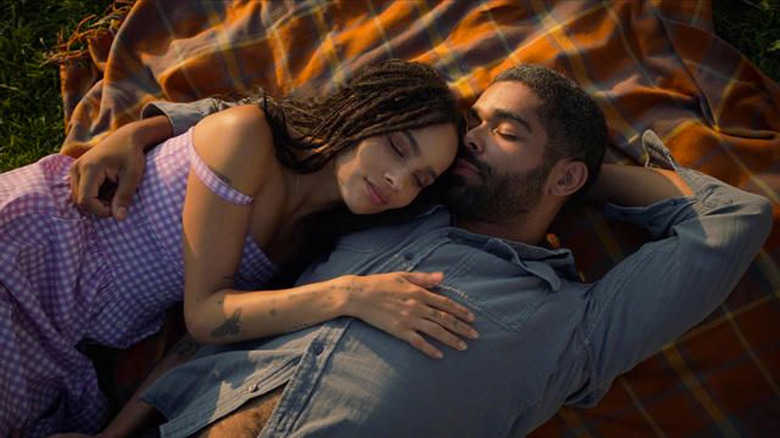
Despite the major love that "High Fidelity" has enjoyed (especially after its cancelation), very few hold out hope for a renewal. The window of opportunity for salvation, even from a neighboring streaming service, is slim to say the least — and as fresh as this wound may still feel, it's been two whole years since the show first premiered. It's probably time to move on.
On the bright side, much of the cast has already moved on in their own ways. Ben-Adir has his hands full on the biopic circuit; Doherty is well on his way to becoming the Sebastian Stan-Chuck Bass hybrid that the new "Gossip Girl" deserves. And most notably, Zoë Kravitz is Catwoman now. The actress may still have strong feelings about Hulu's decision — but now more than ever, Hulu has to realize what they lost. Like with any breakup, Hulu's choice doesn't define the show by any means. It doesn't diminish the quality of the writing, characters, or cast. Sometimes things just aren't meant to be, but hey — at least we've still got the memories, right?
Read this next: The 13 Best Comedy Shows On Amazon Prime Right Now
The post TV, Interrupted: High Fidelity Was the One That Got Away appeared first on /Film.
from /Film https://ift.tt/ypJQngl
No comments: